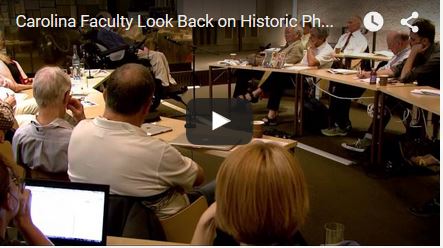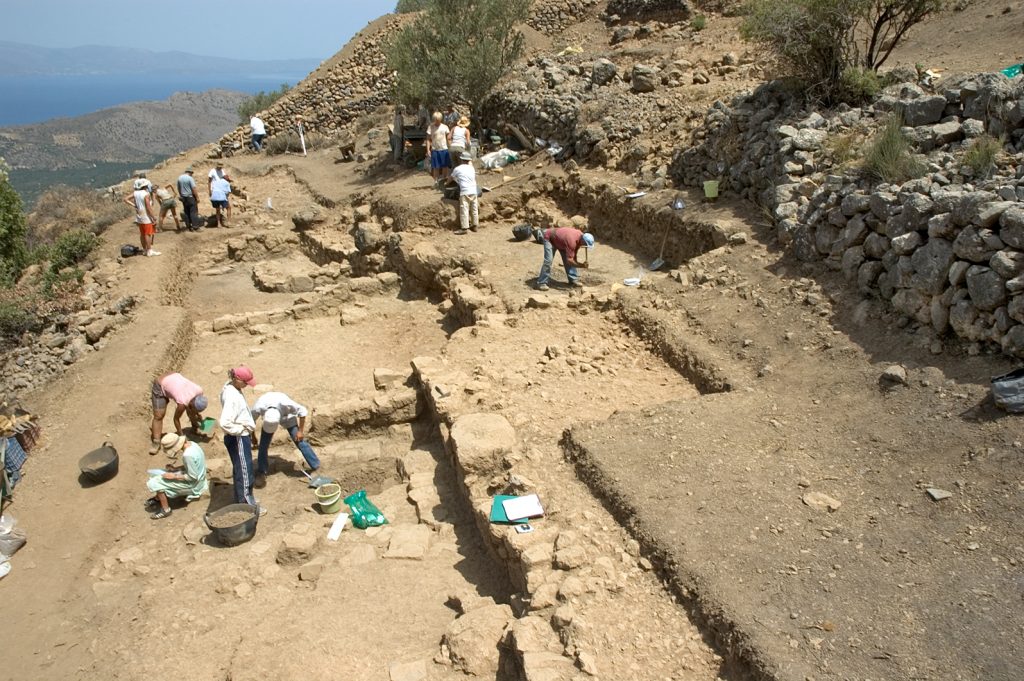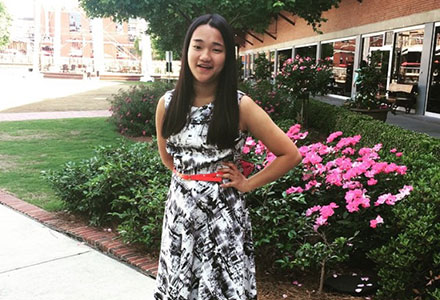 You are what you eat – that’s what Mom always said to nudge us into making healthy food choices. Now Mom has a new ally: The Carolina campus itself is providing an innovative way to encourage people to eat healthily.
You are what you eat – that’s what Mom always said to nudge us into making healthy food choices. Now Mom has a new ally: The Carolina campus itself is providing an innovative way to encourage people to eat healthily.
The concept, known as edible landscaping, mixes food-producing and ornamental plants in the natural landscape. At Carolina, fruit and nut trees, fragrant berry bushes and colorful herbs and vegetables are taking root alongside majestic oak trees and brightly colored dogwoods and azaleas. The idea is both to allow people to grab a healthy snack as they walk through campus and to increase their overall awareness about food sources.
While edible landscapes are becoming more popular in home and community gardening, the idea hasn’t really caught on at universities – until now.
The Edible Campus is the brainchild of Emily Auerbach, who graduated from UNC last spring with a major in environmental sciences and minor in geography and now is serving as a Chancellor’s Fellow, expressly to help bring this idea to fruition. Her goal is to make Carolina the first public university in the country where edible and medicinal plants are integrated into landscapes throughout campus.
“The basic concept is incredibly simple,” she said. “An institution like UNC puts a lot of thought, effort, time and money into creating such an iconic landscape. There is no reason these beautiful surroundings can’t be educational as well. There are so many ways we can bring our landscapes to life.”
The concept may be simple, but turning it into reality is the result of a broad campus effort that began at the top with Chancellor Carol L. Folt’s staunch support. From there, Auerbach connected with top administrators in Finance and Administration, the division that oversees campus planning and operations. Vice Chancellor Matt Fajack and Associate Vice Chancellor for Facilities Services Anna Wu asked Jill Coleman, the University’s landscape architect, to work with Auerbach to put her plan in action.
It takes a village
On Nov. 21, an army of campus and community volunteers turned out for the first planting day. Eighty-one people, including eight from Grounds Services, worked at five sites across campus to get more than 300 plants and trees in the ground.
Herbs and salad greens were planted in raised beds by Lenoir Hall and between Lenoir and Davis Library, and rainbow chard now circles an existing Japanese maple between Woollen and Fetzer gyms. With the guidance of University Forest Manager Tom Bythell, the group planted fruit and nut trees along Stadium Drive. Blueberry bushes went in west of Rams Head Dining Hall, and blueberries and persimmons now grow along the wall between Student and Academic Services Building and Morrison Residence Hall.
Experiencing the landscape is a fundamental part of the Edible Campus, Coleman said. “This ties in directly with the Chancellor’s interest in interactive landscapes, where a landscape isn’t just lovely, it also provides a way for people to experience it,” she said.
In addition to the Chancellor’s Office and departments within Finance and Administration, other Edible Campus partners include the Curriculum for the Environment and Ecology, Davis Library, the Carolina Campus Community Garden (which will receive all excess produce for distribution to low-paid UNC employees), the N.C. Botanical Garden, the Carolina Center for Public Service, the Department of Housing and Residential Education, Student Government’s Environmental Affairs Committee and the N.C. Cooperative Extension Master Gardener Program.
Auerbach gives much of the credit for the project’s early success to her partners, particularly the guidance and expertise of Coleman and the Grounds Services staff. In turn, Coleman describes Auerbach as extraordinary. “She is focused and creative, she has great ideas and she communicates incredibly well,” Coleman said of her young partner.
As it happens, the campus-wide academic theme for 2015–17 is “Food for All: Local and Global Perspectives.” Auerbach hopes to partner with the steering committee to establish the Davis Library Edible Garden as a physical legacy of the “Food for All” theme. “The garden can serve as a lasting symbol of UNC-Chapel Hill’s commitment to leadership in sustainable food system education,” she explained.
Her ultimate goal for the Edible Campus is to help people understand how easily they can make a change in their lives. “If someone looks at an edible landscape, they might decide to plant something in their windowsill or volunteer in a community garden or donate to a food shelter,” Auerbach said.
“Ultimately, I want to make food awareness an integral part of people’s lives.”
Learn more about the Edible Campus and see a map showing the location of edible plants around campus. Read the full story at the Gazette.




